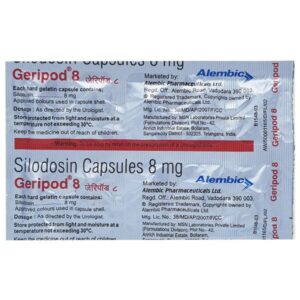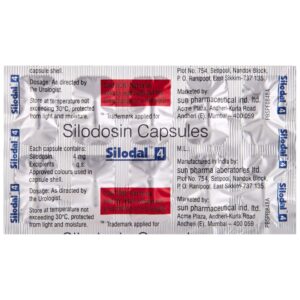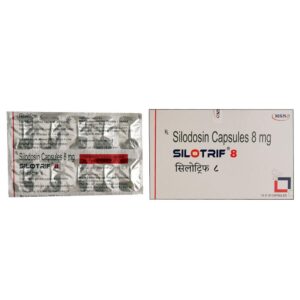SILODOSIN CAPSULES
SILODOSIN CAPSULES: Silodosin capsules are a medication used to treat urinary symptoms in men with enlarged prostate gland (benign prostatic hyperplasia or BPH). It belongs to a class of drugs called alpha-blockers.
The mechanism of action of silodosin involves relaxing the muscles in the prostate and bladder neck. This relaxation helps to relieve symptoms such as difficulty in urination, weak urine flow, frequent urination, and urgency.
The usual recommended dose of silodosin is 8 mg once daily, taken with a meal. It is important to take the medication as directed by your doctor, and it is typically advised to take it at the same time each day.
As with any medication, there are potential side effects associated with silodosin capsules. The most commonly reported side effects include dizziness, headache, abnormal ejaculation (including decreased semen volume or absence of ejaculation), and runny or stuffy nose. These side effects are usually mild and may resolve on their own. However, if they persist or worsen, it is recommended to consult your doctor.
Some less common but potentially serious side effects of silodosin may include fainting, allergic reactions, and a prolonged painful erection (priapism). If you experience any of these severe side effects, immediate medical attention is necessary.
It is important to note that silodosin may interact with certain medications, such as those used to treat high blood pressure, and caution should be exercised if taking these medications concurrently. It is crucial to inform your doctor about all the medications you are currently taking to avoid any potential drug interactions.
In summary, silodosin is a medication that helps alleviate urinary symptoms caused by an enlarged prostate gland. It works by relaxing the muscles in the prostate and bladder neck. The typical dose is 8 mg taken once daily with a meal. Common side effects include dizziness, headache, abnormal ejaculation, and nasal congestion. Serious side effects are rare but may include fainting, allergic reactions, and priapism.




